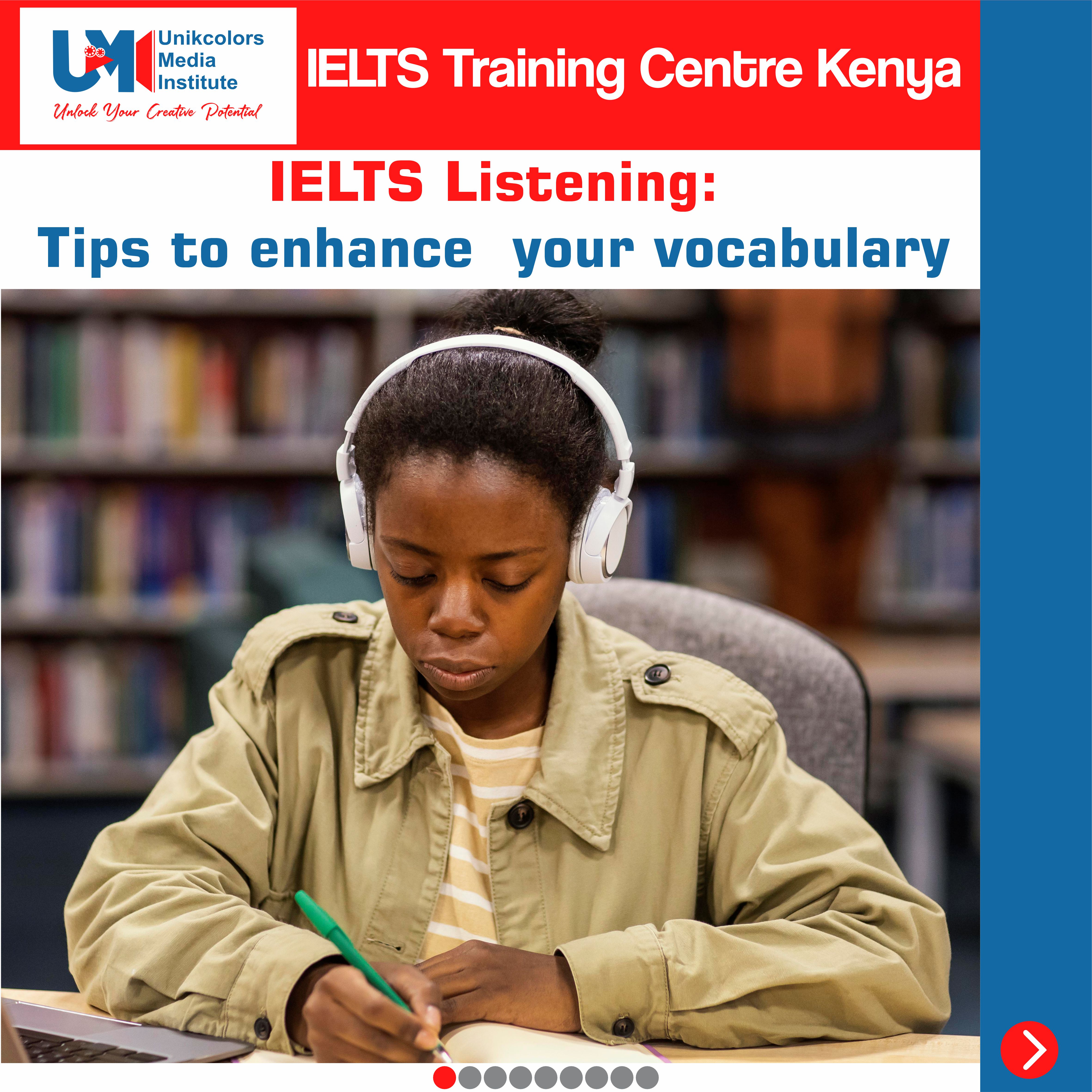IELTS TRAINING CENTRE KENYA - IELTS Preparation - Listening

Title: IELTS TRAINING CENTRE KENYA - IELTS Preparation - Listening
Did you know vocabulary contributes to 25% of your Listening test score?
From frequently used vocabulary in Part-1 to topic-specific vocabulary in Part-4, having a wide vocabulary range can push you one step closer to your desired score.
IELTS Listening:
Tips to enhance your vocabulary
Part 1
Familiar Vocabulary
The basic vocabulary you would have studied when
first learning English is included in Part 1 of the
Listening test.
You will hear a conversation between two people in
an everyday social setting. The vocabulary used will
be familiar word groups relating to everyday life,
dates, times, places, activities, work, and leisure.
Even though these words are used commonly, they
are often misspelled, so valuable marks are lost in
the easiest part of the Listening test.
These include:
- Days of the week (Sunday, Monday, Tuesday,
Wednesday, Thursday, Friday, Saturday)
- Months of the year (January, February...)
- Seasons (Summer, Autumn/Fall, Winter,
Spring)
- Shapes (Circle, Triangle, Square, Rectangle)
- Transportation types (Car, Truck, Tram,
Airplane)
- Colours (Red, Orange, Yellow, Green, Blue)
- Verbs (Suggest, Develop, Borrow)
- Adjectives (Beautiful, Fantastic, Exciting)
Part 2
A monologue, speech or talk
In part 2 of the IELTS Listening test, you will hear
a monologue set in an everyday context.
You might hear a speech about local facilities,
describing the layout recreation centre’s layout,
option of rooms in a particular building.
There are a variety of question types in this part of
the test, and some questions may involve maps, so
there is vocabulary that may be helpful to know.
These include:
- Rooms in a building (Kitchen, Bathroom,
Bedroom, Living Room, Dining Room)
- Place markers ( Street, Road, Avenue, Lane)
- Directions (North, East, South, West, Up, Down,
Right, Left, Straight, across)
- Verbs (Turn, Move, Continue On, Walk)
- Places on a map (River, Courtyard, Bridge, Road,
Path, Traffic Light, Table, Court, Forest, Beach,
Garden)
Part 3
A conversation between people
In part 3 of the IELTS Listening test, you will hear
a conversation between up to four people. This
conversation will generally be set in an educational
or training context; for example, a university
lecturer discussing an assignment with two
students.
Being familiar with academic-related vocabulary
connected to learning, study, and assessment
may be helpful for this part of the test.
These includes:
- School terms (Presentation, Project, Teamwork,
Pairs, Organization, Outline)
- Subjects in school (Mathematics (Maths),
Science, English, Physical Education (PE)
- Subjects in University (Commerce, Science,
Psychology, Engineering, Marketing, Sociology)
- Examination terms (Assessment, test, revision,
pass, fail, repeat, supervise)
Part 4
A university lecture
Even though part 4 is the most challenging part of
the IELTS Listening test, the vocabulary used is
still common knowledge.
Part 4 is also based on academics, so a range of
different topics could be spoken about.
Look through the range of topic areas in the
following picture to review some of the frequently
used vocabulary.
Register via our website www.unikcolors.co.ke
Contact us on 0792414617
